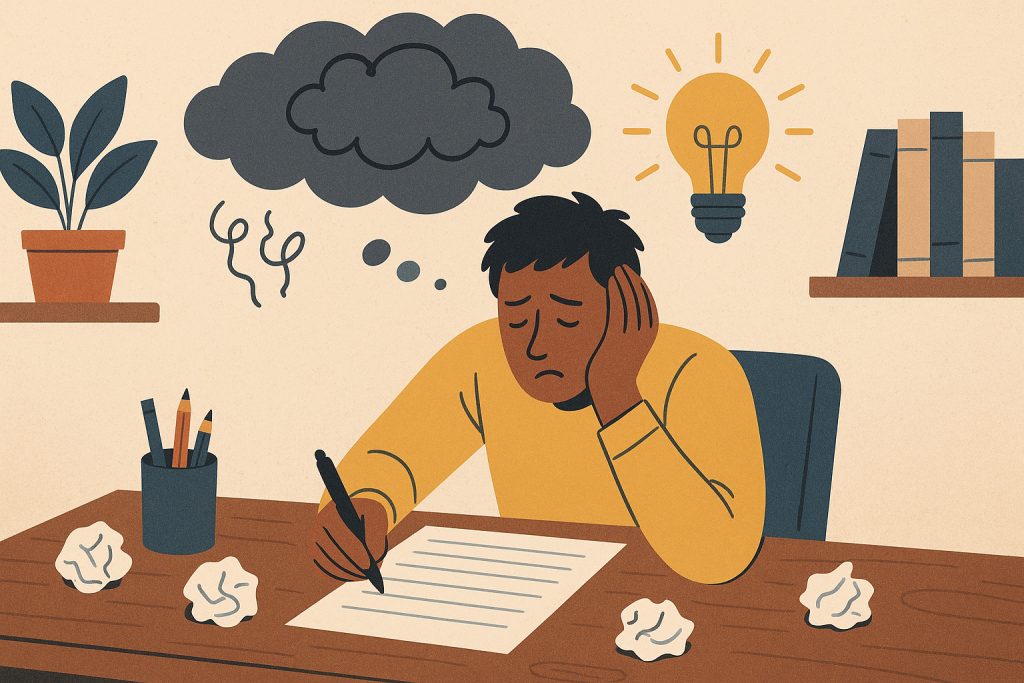You’ve been writing papers, articles, or chapters with utmost inspiration and passion. All of a sudden, that spark in your eyes vanishes, and you can no longer collect your thoughts to push out another sentence. Everything you put down on paper just doesn’t sound right: it’s rigid and won’t attract enough attention from the reader. You’re frustrated and don’t know how to continue… That’s exactly what writer’s block is.
Whether you are a copywriter or a student, you’ve probably faced this hardship before. All of us have struggled with it, so you’re not alone. In fact, there are ways to overcome it. In this article, we will unpack what writer’s block is, its main causes, and how to battle it.
What Is Writer’s Block and What Causes It?
Writer’s block is a state where a writer feels completely stuck in the process and can’t think of anything new. Everything lacks inspiration, and they are overwhelmed with frustration trying to continue writing. How does one even tell a story if the writing is not engaging?
This phenomenon is not new at all. It has been studied and researched in the past — that’s how the main causes were uncovered. There are four of them in total:
- anxiety and lack of confidence;
- lack of acknowledgement and anger;
- apathy towards writing rules and a lack of creativity;
- comparison and disappointment in one’s own skills.
As you can see, writer’s block is not a small hurdle. Many mental frustrations are hiding under the covers, ready to push any writer into a state of apathy and self-doubt.
Overcoming Writer’s Block
Thankfully, you can get out of writer’s block effectively. Everyone can find something that works best for them, depending on their style of writing and niche. Let’s learn how to do it now.
Write Daily
Yes, writing is excruciating when you’re in a block. And yes, you still have to write more. It might seem confusing, but doing so every day will help you find new ideas and create a healthy habit. Even 10 minutes or a few sentences is enough, you don’t need to come up with a whole chapter or article. Set a timer and let yourself freestyle — it doesn’t have to make sense.
Search for Inspiration Online
When stuck, try searching the internet for more inspiration. Look for styles and writers different from you. You can use a mobile VPN service to read geolocked online content and make sure you reach all the creative corners of the web without any restrictions. All you have to do is install the plugin, turn it on, and you are ready to explore.
Forget About the Rules
Most jobs, schools, and universities demand that you follow certain rules when writing content. For some, these can be constraining and frustrating. If you feel the same, it’s okay to practice without the rules to overcome a block. Sit down and try writing without thinking about grammar, punctuation, or timeline. Start from the middle or the end for a fresh look at your composition.
Find a Special Place
If you’re used to jotting everything down in your room, it’s a great idea to explore a different place where you can work. Try different locations, such as a coffee shop with a lot of background noise or a library where everyone stays quiet and busy with their own work. Just make sure you use a password manager to protect your account login information when connecting to public Wi-Fi. This tool creates unique, complex passwords and saves them in an encrypted vault, so hackers can’t access them even if they try.
Take Breaks
Although it is important to continue noting things down, it is equally as crucial to take regular breaks. In some cases, writer’s block is caused by overworking and burning out. When you’re stuck, get up, make something to drink, and grab a snack. If this doesn’t help, take more time off and go for an evening stroll. Free time will allow you to get your mind off writing and come back with new ideas.
Set Clear Goals
Whether you are a student or a content writer, you might feel overwhelmed with the amount of work you have. Setting smaller goals for each project phase can minimize this effect, giving you enough time to work without getting stressed. Map out daily or weekly deadlines and stay focused until you are completely done.
Read More
Regardless of your area of interest or niche, try reading more different content. If you are into journalism, go beyond news articles and read novels or poetry. In case you are writing non-fiction, try studying social media copywriting. Taking a shift from your genre can be a perfect refresher for when you get back to work.
Try a Different Approach
Similar to reading various media, taking a different approach to writing can get rid of mental blocks. Are you used to typing everything out? Then, grab a pen and a notebook and venture out of your home to write everything by hand. You can also turn on a voice recorder on your smartphone and vocalise your ideas. By changing the way you create content, you challenge your brain to take a completely forgotten path, such as writing by hand or simply talking to yourself like small children do.
Ready to Write Once Again!
Writer’s block is a terrible state. It stops you from creating, makes the process extremely frustrating, and costs you money and time. Thankfully, it’s possible to overcome it. To boost your creativity, you can read more, search for inspiration online, and write every day. You can also change your approach by working in a different location, vocalizing your ideas, and forgetting about common rules for some time.
Lastly, set smaller goals and take time off when you feel too overwhelmed and stressed. Remember: your mental state should be prioritized over everything else, including writing.

